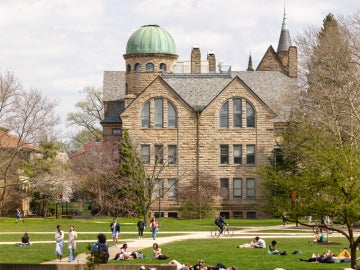Marwan Ghanem '22 Receives Nexial Prize
The award is given annually to a student who demonstrates excellence in the pursuit of interdisciplinary research.
July 18, 2022
Amanda Nagy

Marwan Ghanem '22, a graduate in biology and neuroscience, is the recipient of the 2022 Oberlin College Nexial Prize.
Photo credit: Tanya Rosen-Jones '97
Marwan Ghanem came to Oberlin College from a STEM-centered high school in Egypt, where he worked in teams to design and test solutions for Egypt’s challenges. While he considers himself fortunate to have an early foundation in interdisciplinary research, it was through Oberlin’s liberal arts courses in anthropology, history, and sociology that Ghanem began to rethink approaches to problem solving.
A resident of El Mahalla El Kobra, Egypt, Ghanem proudly holds the distinction of being the first African, Arab, and international Muslim student to receive Oberlin’s 2022 Nexial Prize, a $50,000 award made annually to a member of the graduating class whose science studies are complemented by a profound interest in the study of culture. With majors in biology and neuroscience and a minor in Middle Eastern and North African studies, Ghanem will use the Nexial Prize to study how cultural upbringing might influence the development of neuropsychiatric disorders among Arab youth.
“I feel honored that Oberlin believes in my potential as a next-generation leader and scientist,” Ghanem says. “The Nexial Prize will advance my goal of understanding neuropsychiatric disorders.”
The Nexial Prize was launched in 2017 with support from an alumnus who wanted to recognize the contribution that Oberlin’s liberal arts education made to his successful career as a scientist and manager, as well as his growth intellectually and culturally.

During his academic and experiential learning journey at Oberlin, Ghanem received the Oberlin College Research Fellowship award through the Office of Undergraduate Research and studied the neural mechanisms behind drug addiction and learning with Assistant Professor of Neuroscience Christopher Howard, where he was a contributing author on three papers.
Under the mentorship of Biggs Professor of Neuroscience Gunnar Kwakye, he developed his understanding of genetic and environmental influences in neurodegeneration. Specifically, Ghanem and Kwakye are co-authors on a paper in preparation that examines how the huntingtin gene and heavy metals cooperatively alter cellular and biochemical processes to promote Huntington’s disease. He also studied Middle Eastern cinema history in a private reading with Professor of History Zeinab Abul-Magd.
“I was attracted to Oberlin’s liberal arts education, which widened my horizons to non-STEM fields like the study of cultures in anthropology, history, and sociology, in addition to the exceptional training in neuroscience research,” Ghanem says.
Through Oberlin’s Winter Term and summer research grants, he conducted research at Zewail City of Science and Technology in Egypt to develop a portable water filtration system for arid areas in Africa.
“Oberlin reshaped the way I approach the world and its challenges. I came to discover the key to solving problems is vulnerability—being vulnerable to admit lacking the knowledge and to find humility is what a scientist needs to solve big problems.”
Kwakye, whose research team studies the impact of environmental pollutants on the development and progression of various neurological disorders such as Parkinson’s, Huntington’s, and multiple system atrophy diseases, says he admires Ghanem’s positive attitude, work ethic, and growth mindset.
“I have been impressed with his humility and cross-disciplinary knowledge. He perseveres through challenges, loves to learn, and supports the younger generation of students,” Kwakye says. “His dedication to research and ability to work independently and collaboratively are outstanding. I am optimistic that these qualities will propel him to success in graduate school and beyond, and I am delighted that he has received this well-deserved recognition.”
At Oberlin, Ghanem was a Bonner Scholar, and he was involved in the Muslim Students Association, the African Students Association, and the Middle Eastern and North African Students Association. He also participated in the Interfaith Student Council and Barefoot Dialogue.
Ghanem plans to enroll in the neuroscience PhD program at the Scripps Research Institute.
You may also like…
Oberlin Launches Critical AI Studies Minor in Fall 2026
With a solid foundation in both science and the humanities, this minor ensures students to understand and be able to analyze the ethical, cultural, environmental, political, economic, technological, and labor effects of AI.
Chudi Martin Jr. ’24 Earns Prestigious Gates Cambridge Scholarship
Chudi Martin Jr. ’24 earns prestigious Gates Cambridge Scholarship.
Oberlin Named a Top Producer of Fulbright Students for 2025-26
Oberlin College and Conservatory was named a Top Producer of Fulbright students for the 2025-2026 academic year.


